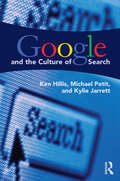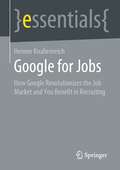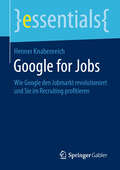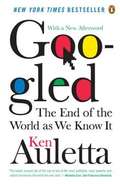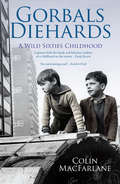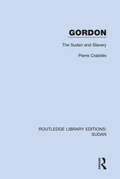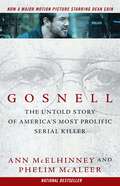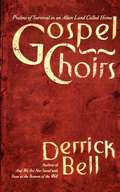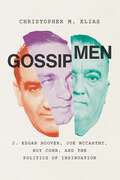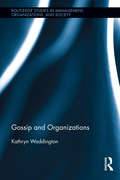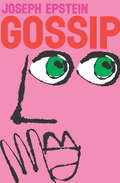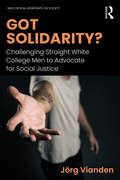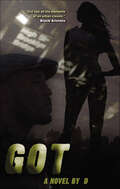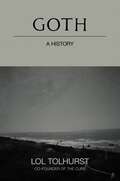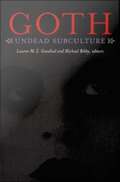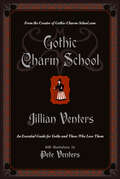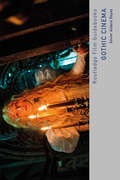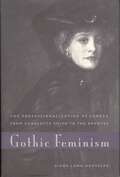- Table View
- List View
Google and the Culture of Search
by Ken Hillis Kylie Jarrett Michael PetitWhat did you do before Google? The rise of Google as the dominant Internet search provider reflects a generationally-inflected notion that everything that matters is now on the Web, and should, in the moral sense of the verb, be accessible through search. In this theoretically nuanced study of search technology’s broader implications for knowledge production and social relations, the authors shed light on a culture of search in which our increasing reliance on search engines influences not only the way we navigate, classify, and evaluate Web content, but also how we think about ourselves and the world around us, online and off. Ken Hillis, Michael Petit, and Kylie Jarrett seek to understand the ascendancy of search and its naturalization by historicizing and contextualizing Google’s dominance of the search industry, and suggest that the contemporary culture of search is inextricably bound up with a metaphysical longing to manage, order, and categorize all knowledge. Calling upon this nexus between political economy and metaphysics, Google and the Culture of Search explores what is at stake for an increasingly networked culture in which search technology is a site of knowledge and power.
Google for Jobs: How Google Revolutionizes the Job Market and You Benefit in Recruiting (essentials)
by Henner KnabenreichAlmost all search queries are now made via Google and the search for a new job via Google is also increasing steadily. Thanks to Google for Jobs, Google's claim to offer users the best search experience is now also evident in the job search. Henner Knabenreich presents the most important findings about Google for Jobs and provides important tips and hints for successful use. He shows that companies benefit from an unprecedented opportunity to provide reach - regardless of size, industry and job description. To bring applicants and companies together in the best and fastest possible way is Google's claim. Find out how you as an employer can benefit from this job search here.The author:Henner Knabenreich has been working on the career pages and application processes of employers since 2003. As an “employer branding optimizer”, he advises companies on the implementation of career websites, has been promoting the role of SEO in the context of recruiting for years and observes Google's activities in the job market. He is author of the book "Career Websites with Wow! effect" and blogs on an influential HR blog. This Springer essential is a translation of the original German 1st edition essential, Google for Jobs by Henner Knabenreich published by Springer Fachmedien Wiesbaden GmbH, part of Springer Nature in 2019. The translation was done with the help of artificial intelligence (machine translation by the service DeepL.com). A subsequent human revision was done primarily in terms of content, so that the book will read stylistically differently from a conventional translation. Springer Nature works continuously to further the development of tools for the production of books and on the related technologies to support the authors.
Google for Jobs: Wie Google den Jobmarkt revolutioniert und Sie im Recruiting profitieren (essentials)
by Henner KnabenreichNahezu alle Suchanfragen erfolgen heute über Google und auch die Suche nach einem neuen Job via Google steigt stetig an. Googles Anspruch, Nutzern das beste Sucherlebnis zu bieten, zeigt sich dank Google for Jobs nun auch in der Stellensuche. Henner Knabenreich stellt die wichtigsten Erkenntnisse zu Google for Jobs dar und vermittelt wichtige Tipps und Hinweise für die erfolgreiche Nutzung. Er zeigt, dass Unternehmen von einer nie da gewesenen Möglichkeit profitieren, für Reichweite zu sorgen – unabhängig von Größe, Branche und Berufsbild. Bewerber und Unternehmen best- und schnellstmöglich zusammenzubringen, ist Googles Anspruch. Wie Sie als Arbeitgeber von dieser Jobsuche profitieren, erfahren Sie hier.Der Autor: Henner Knabenreich beschäftigt sich seit 2003 mit den Karriereseiten und den Bewerbungs-Prozessen von Arbeitgebern. Als Arbeitgebermarkenauftrittsoptimierer berät er Unternehmen bei der Umsetzung von Karriere-Websites, propagiert bereits seit Jahren die Rolle von SEO im Kontext Recruiting und beobachtet Googles Aktivitäten im Jobmarkt. Er ist Autor des Werks „Karriere-Websites mit Wow!-Effekt und bloggt auf einem einflussreichen HR-Blog.
Googled
by Ken AulettaThere are companies that create waves and those that ride or are drowned by them. This is a ride on the Google wave, and the fullest account of how it formed and crashed into traditional media businesses. With unprecedented access to Google's founders and executives, as well as to those in media who are struggling to keep their heads above water, Ken Auletta reveals how the industry is being disrupted and redefined. Auletta goes inside Google's closed-door meetings, introducing Google's notoriously private founders, Larry Page and Sergey Brin, as well as those who work with - and against - them. In Googled, the reader discovers the 'secret sauce' of the company's success and why the worlds of 'new' and 'old' media often communicate as if residents of different planets. It may send chills down traditionalists' spines, but it's a crucial roadmap to the future of media business: the Google story may well be the canary in the coal mine. Googled is candid, objective and authoritative. Crucially, it's not just a history or reportage: it's ahead of the curve and unlike any other Google books, which tend to have been near-histories, somewhat starstruck, now out of date or which fail to look at the full synthesis of business and technology.
Googled
by Ken AulettaA revealing, forward-looking examination of the outsize influence Google has had on the changing media Landscape. There are companies that create waves and those that ride or are drowned by them. As only he can, bestselling author Ken Auletta takes readers for a ride on the Google wave, telling the story of how it formed and crashed into traditional media businesses?from newspapers to books, to television, to movies, to telephones, to advertising, to Microsoft. With unprecedented access to Google?s founders and executives, as well as to those in media who are struggling to keep their heads above water, Auletta reveals how the industry is being disrupted and redefined. Using Google as a stand-in for the digital revolution, Auletta takes readers inside Google?s closed-door meetings and paints portraits of Google?s notoriously private founders, Larry Page and Sergey Brin, as well as those who work with?and against?them. In his narrative, Auletta provides the fullest account ever told of Google?s rise, shares the ?secret sauce? of Google?s success, and shows why the worlds of ?new? and ?old? media often communicate as if residents of different planets. Google engineers start from an assumption that the old ways of doing things can be improved and made more efficient, an approach that has yielded remarkable results? Google will generate about $20 billion in advertising revenues this year, or more than the combined prime-time ad revenues of CBS, NBC, ABC, and FOX. And with its ownership of YouTube and its mobile phone and other initiatives, Google CEO Eric Schmidt tells Auletta his company is poised to become the world?s first $100 billion media company. Yet there are many obstacles that threaten Google?s future, and opposition from media companies and government regulators may be the least of these. Google faces internal threats, from its burgeoning size to losing focus to hubris. In coming years, Google?s faith in mathematical formulas and in slide rule logic will be tested, just as it has been on Wall Street. Distilling the knowledge accrued from a career of covering the media, Auletta will offer insights into what we know, and don?t know, about what the future holds for the imperiled industry.
Gorbachev and Southeast Asia (Routledge Revivals)
by Leszek BuszynskiFirst published in 1992, this book examines Soviet foreign policy towards Southeast Asia in the context of the transformation of the perestroĭka era in the Soviet Union. The discussion begins in 1985 and ends in 1989 with the Soviet partial withdrawal from Cam Ranh Bay. Buszynski considers Gorbachev’s effort to disengage from the Cambodian problem, the weakening of the Soviet alliance with Vietnam and the real effort to overcome old hostilities with growth areas in ASEAN such as Thailand and Singapore. This is a fascinating and relevant title, of particular value to students with an interest in Russia and the history of international relations in Southeast Asia.
Gorbals Diehards: A Wild Sixties Childhood
by Colin MacFarlaneEnid Blyton wrote about the Famous Five - wholesome kids who were always up to some adventure or other - but during the 1960s Glasgow boy Colin MacFarlane had his own gang: the Incredible Gorbals Diehards. These were young boys trying to survive in one of the world's toughest areas, the infamous slums of Glasgow.During the gang's daily adventures, they came across a plethora of undesirable characters, including foul-mouthed drunks, thieves, razor-flicking gang members, con men, fly men and street brawlers. Through it all, MacFarlane and his band of brothers retained their sense of humour while roaming the filthy, stench-ridden Gorbals backstreets.In the third volume of his acclaimed memoirs, bestselling author Colin MacFarlane reveals what it was like to grow up on the streets of the Gorbals during this period. Be prepared to be shocked and entertained at the adventures of the gang that called themselves the Incredible Gorbals Diehards.
Gordon: The Sudan and Slavery (Routledge Library Editions: Sudan)
by Pierre CrabitèsThe critics of Charles George Gordon accused him of vacillation and of instability of character. His supporters refused to admit that he was inconstant; they took the position that it was the Gladstone Cabinet which manifested a spirit of indecision that was fraught with terrible consequences. General Gordon was a prolific letter-writer, and he also kept a journal. Many official notes and dispatches deal with his final mission to Khartoum. This book, first published in 1933, attempts to get at the truth of Gordon’s character and his time in the Sudan through these letters, this journal, these notes and despatches.
Gorgeous Beasts: Animal Bodies in Historical Perspective (Animalibus)
by Paula Young Lee Joan B. Landes Paul YoungquistGorgeous Beasts takes a fresh look at the place of animals in history and art. Refusing the traditional subordination of animals to humans, the essays gathered here examine a rich variety of ways animals contribute to culture: as living things, as scientific specimens, as food, weapons, tropes, and occasions for thought and creativity. History and culture set the terms for this inquiry. As history changes, so do the ways animals participate in culture. Gorgeous Beasts offers a series of discontinuous but probing studies of the forms their participation takes. This collection presents the work of a wide range of scholars, critics, and thinkers from diverse disciplines: philosophy, literature, history, geography, economics, art history, cultural studies, and the visual arts. By approaching animals from such different perspectives, these essays broaden the scope of animal studies to include specialists and nonspecialists alike, inviting readers from all backgrounds to consider the place of animals in history and art. Combining provocative critical insights with arresting visual imagery, Gorgeous Beasts advances a challenging new appreciation of animals as co-inhabitants and co-creators of culture.Aside from the editors, the contributors are Dean Bavington, Ron Broglio, Mark Dion, Erica Fudge, Cecilia Novero, Harriet Ritvo, Nigel Rothfels, Sajay Samuel, and Pierre Serna.
Gorgeous Beasts: Animal Bodies in Historical Perspective (Animalibus: Of Animals and Cultures #2)
by Paula Young Lee Joan B. Landes Paul YoungquistGorgeous Beasts takes a fresh look at the place of animals in history and art. Refusing the traditional subordination of animals to humans, the essays gathered here examine a rich variety of ways animals contribute to culture: as living things, as scientific specimens, as food, weapons, tropes, and occasions for thought and creativity. History and culture set the terms for this inquiry. As history changes, so do the ways animals participate in culture. Gorgeous Beasts offers a series of discontinuous but probing studies of the forms their participation takes. This collection presents the work of a wide range of scholars, critics, and thinkers from diverse disciplines: philosophy, literature, history, geography, economics, art history, cultural studies, and the visual arts. By approaching animals from such different perspectives, these essays broaden the scope of animal studies to include specialists and nonspecialists alike, inviting readers from all backgrounds to consider the place of animals in history and art. Combining provocative critical insights with arresting visual imagery, Gorgeous Beasts advances a challenging new appreciation of animals as co-inhabitants and co-creators of culture.Aside from the editors, the contributors are Dean Bavington, Ron Broglio, Mark Dion, Erica Fudge, Cecilia Novero, Harriet Ritvo, Nigel Rothfels, Sajay Samuel, and Pierre Serna.
Gosnell: The Untold Story of America's Most Prolific Serial Killer
by Ann Mcelhinney Phelim McaleerHe is America’s most prolific serial killer. And yet Kermit Gosnell was no obvious criminal. The abortion doctor was a pillar of his community, an advocate for women’s “reproductive health,” and a respected member of Philadelphia’s professional elite. His Women’s Medical Society Clinic looked like admirable community outreach by a brave doctor committed to upholding women’s rights. Meanwhile, inside the filthy building, Gosnell was casually murdering born-alive infants, butchering women, and making a macabre collection of severed babies’ feet. His accomplices in crime were a staff of dropouts, drug addicts, and unlicensed medical professionals posing as doctors. But even more important to his decades-long crime spree were his enablers in the outside world—from the state bureaucrats who had copious evidence that Gosnell was breaking the law but did nothing to the politicians whose fervent support for abortion rights kept health inspectors away. The “pro-choice” political, bureaucratic, and media establishment smiled on Gosnell—and gave him carte blanche to kill. Even law enforcement seemed to not care. Philadelphia Police Homicide Unit received a complaint about Gosnell years before he was caught, gave it a cursory look, and ignored the evidence. Two women and hundreds of babies died after they closed the case. Luckily, Detective Jim Wood—a narcotics detective—opened a drug case against Gosnell. What he found when he served his warrant left even the most grizzled members of the police force stunned. Now Ann McElhinney and Phelim McAleer, the veteran investigative journalists and filmmakers behind FrackNation, dig into Gosnell’s crimes. A record-breaking crowdfunding campaign financed their Gosnell movie starring young Superman Dean Cain, but in the research for the film, McElhinney and McAleer uncovered fascinating and previously unreported revelations that couldn’t be included in the film. Gosnell: The Untold Story of America’s Most Prolific Serial Killer contains the full results of their investigation.
Gospel Choirs
by Derrick A. BellJust like the songs of a gospel choir, the pieces in this book give voice to the hardships faced by African Americans. Through allegorical stories and fictional encounters, dreams and dialogues, it presents fresh perspectives on the different issues that concern blacks. Despite their tough subjects, however, these stories resound with laughter and compassion and a continuing theme of Christian love.
Gossip
by Patricia Meyer SpacksExplores the nature, morality, and aesthetics of gossip; examines gossip in history and the psychology of gossip; and analyzes gossip--as subject and literary technique--in plays, letters, biographies, and novels.
Gossip Men: J. Edgar Hoover, Joe McCarthy, Roy Cohn, and the Politics of Insinuation
by Christopher M. EliazJ. Edgar Hoover, Joseph McCarthy, and Roy Cohn were titanic figures in midcentury America, wielding national power in government and the legal system through intimidation and insinuation. Hoover’s FBI thrived on secrecy, threats, and illegal surveillance, while McCarthy and Cohn will forever be associated with the infamous anticommunist smear campaign of the early 1950s, which culminated in McCarthy’s public disgrace during televised Senate hearings. In Gossip Men, Christopher M. Elias takes a probing look at these tarnished figures to reveal a host of startling new connections among gender, sexuality, and national security in twentieth-century American politics. Elias illustrates how these three men solidified their power through the skillful use of deliberately misleading techniques like implication, hyperbole, and photographic manipulation. Just as provocatively, he shows that the American people of the 1950s were particularly primed to accept these coded threats because they were already familiar with such tactics from widely popular gossip magazines. By using gossip as a lens to examine profound issues of state security and institutional power, Elias thoroughly transforms our understanding of the development of modern American political culture.
Gossip and Organizations (Routledge Studies in Management, Organizations and Society)
by Kathryn WaddingtonGossip is a complex and ubiquitous phenomenon, widely found and variously practiced. Gossip and Organizations provides the reader with an analysis of gossip and informal knowledge across different national, organizational and cultural contexts, drawing upon empirical findings and the author's experiences of researching gossip in nursing and healthcare organizations and higher educational institutions. Kathryn Waddington aims to dispel once and for all the myth that women gossip and men have conversations, shattering the illusion that gossip at work is trivial talk. This book challenges the assumption that gossip is a problem that should be discouraged. While there is undoubtedly a dark side to gossip, Kathryn Waddington argues that paying closer attention to gossip as organizational communication and knowledge enables exploration of other ways of seeing, interpreting and understanding organizations. Gossip is not merely an impediment of organizing, it is a form of organizing which shapes perceptions and actions, and can forewarn managers of future failure in organizational systems. The complexity of gossip is such that a of range inter-disciplinary explanations is necessary in order to account for this form of communication and knowledge across multiple levels and spaces in and around organizations. Waddington provides a new evidence-based framework incorporating ethics, emotion, identity, sensemaking and power as a guide future research, theorizing and critical reflective and reflexive practice in the field of organizational gossip.
Gossip: The Untrivial Pursuit
by Joseph EpsteinA look at the delights—and dangers—of gossip, from a New York Times–bestselling, &“erudite writer, gifted with rare insight and a wry sense of humor&” (USA Today). Gossip is no trivial matter. In this enlightening and entertaining study, the author of Snobbery takes a look at a human activity that may be looked down upon, but nevertheless plays a persistent role in our society—and therefore, must be taken seriously. Joseph Epstein, who admits to indulging in this activity himself from time to time, serves up mini-biographies of history&’s famous gossips, and makes a powerful case that gossip has morphed from its old-fashioned best—clever, mocking, a great private pleasure—to a corrosive, destructive new version, thanks to the reach of the mass media and the Internet. This is an erudite and witty read from &“a master observer of humanity&’s foibles&” (Kirkus Reviews, starred review). &“Epstein defines categories of gossip, from personal to celebrity, workplace, and political, and discusses how gossip &‘enforces a community&’s norms&’ or, conversely, helps foster tolerance. . . . In his briskly erudite, zestfully original, and provokingly enjoyable anatomy of gossip, Epstein revels in the risky collusion of gossip within shared worlds and resoundingly condemns media-disseminated gossip that diminishes our ability to ascertain or value the truth.&” —Booklist
Got Solidarity?: Challenging Straight White College Men to Advocate for Social Justice
by Jörg ViandenThe 21st Century in the United States continues to be marked by persistent disparities between members of different classes, races, genders, and sexual orientations. Influencers of this society seem bent on polarizing citizens along their diverse identities, often blaming those already disadvantaged for the nation’s apparent plights. Elite white men still benefit from a political, economic, and social hegemony and some ardently resist an egalitarian society. Preserving American democracy rests in the hands of young Americans committed to equity and social justice. In Got Solidarity?, Jörg Vianden reports the results from the Straight White College Men Project, a nationwide qualitative study of how heterosexual white college men experience or perceive campus and community diversity issues. In college, few white men tend to engage in majors, discussions, or courses on diversity, inclusion, equity, or social justice. Indeed, many white men say that they have "no place" in these discussions, and more commonly assert that "diversity is not about them." Using a sociological perspective, the author chronicles their upbringing in families and schools, their perspectives on race, gender, and sexual orientation, as well as their trepidations on challenging oppression they notice taking place around them. Their stories lead to a renewed understanding of how white disengagement constrains progress toward a just society. This book offers strategies for enhancing college teaching and learning, adds to the body of research on identity development theory, and provides implications for improving campus climates, fostering social justice advocacy, as well as re-designing programs promoting understanding of human differences. Written especially for straight white male college students, as well as for educators at all levels, this book underscores the critical need for whites to raise consciousness, activate empathy, and build solidarity with members of minoritized social groups. Given the current American predicament, Got Solidarity? makes a timely contribution to our understanding of masculinity and endeavors to create a just society.
Got: A Novel (Seven Weapon Arsenal #0)
by DThe first title from The Armory, a new high-quality urban noir imprint edited by Kenji Jasper.“There’s a new player stepping into the street-lit spotlight, and he’s one to watch . . . Urban libraries have to get Got.” —Library Journal, Starred ReviewThere’s a young man living in the infamous Crown Heights section of Brooklyn. He is an orphaned college student trying to get through his sophomore year at age twenty-three, years behind the traditional undergraduates. His two best friends, Will and Chief, are an ex-drug dealer and a computer hacker. And his boss, Tony Star, is the most dangerous man in Brooklyn, an arch-criminal with enterprises legal and illegal across New York City and beyond.Our young man’s job is to pick up the weekly take from Star’s establishments and deliver it to him at the end of a night. It’s one day’s work a week for the kind of pay the fortunate get in a year. The money covers his tuition and the small apartment he rents in Crown Heights. Life is simple. And simple means good.Then, everything falls out of balance. Someone decides to rob him for the week’s take, and leave him for dead. His boss, being generous, gives him until the end of the night to recover what’s been stolen. But as the night moves forward and people start dying, this young man begins to learn the hard way that his chosen way of life is nothing but an illusion.
Goth: A History
by Lol TolhurstThe co-founder of The Cure and author of Cured delivers a fascinating deep dive into the dark romanticism of Goth music, a misunderstood genre and culture. GOTH is an entertaining and engaging historical memoir, and a journey through Goth music and culture, exploring creative giants like The Cure, Siouxsie and the Banshees, Bauhaus, Joy Division, and many more great bands that offered a place of refuge for the misfits of the &‘80s and ever since. Written by Lol Tolhurst, co-founder of The Cure, this book offers a riveting retrospective of the genre&’s iconic movers and shakers, infused with stories from Tolhurst&’s personal trove of memories, as well as anecdotes about the musicians, magicians, and artists who made it all happen—the people, places, and things that made Goth an inevitable and enduring movement. Starting with the Origins of Goth, Tolhurst explores early art and literature that inspired the genre and looks into the work of T.S Eliot, Edgar Allan Poe, Sylvia Plath, and Albert Camus, among others. He also outlines the path of Gothic Forebears and shows how many musicians played in punk bands before transitioning into Goth endeavors. Next, he introduces readers to the &“Architects of Darkness&”—Bauhaus, Siouxsie and the Banshees, Joy Division, and The Cure—the Godfathers of Goth who established the genre's roots. Following these early bands, Tolhurst discusses a group he calls the &“Spiritual Alchemists,&” consisting of bands like Depeche Mode, Cocteau Twins, and more, who helped the darkness expand into the culture. He also tracks the expansion of the genre overseas, from England to New York, Los Angeles, and beyond. Gothic fashion was an important part of the movement as well, and Tolhurst discusses the clothing that accompanied and complemented the music. Finally, Tolhurst examines the legacy of Goth music, and shows how its influence can still be seen to this day across music, film, TV, visual arts, social media, and more. As thoughtful and thorough as it is utterly bewitching, GOTH is a timeless testament to why Goth matters—and why it always will.
Goth: Undead Subculture
by Lauren M.E. Goodlad Michael BibbySince it first emerged from Britain's punk-rock scene in the late 1970s, goth subculture has haunted postmodern culture and society, reinventing itself inside and against the mainstream. Goth: Undead Subculture is the first collection of scholarly essays devoted to this enduring yet little examined cultural phenomenon. Twenty-three essays from various disciplines explore the music, cinema, television, fashion, literature, aesthetics, and fandoms associated with the subculture. They examine goth's many dimensions--including its melancholy, androgyny, spirituality, and perversity--and take readers inside locations in Los Angeles, Austin, Leeds, London, Buffalo, New York City, and Sydney. A number of the contributors are or have been participants in the subculture, and several draw on their own experiences. The volume's editors provide a rich history of goth, describing its play of resistance and consumerism; its impact on class, race, and gender; and its distinctive features as an "undead" subculture in light of post-subculture studies and other critical approaches. The essays include an interview with the distinguished fashion historian Valerie Steele; analyses of novels by Anne Rice, Poppy Z. Brite, and Nick Cave; discussions of goths on the Internet; and readings of iconic goth texts from Bram Stoker's Dracula to James O'Barr's graphic novel The Crow. Other essays focus on gothic music, including seminal precursors such as Joy Division and David Bowie, and goth-influenced performers such as the Cure, Nine Inch Nails, and Marilyn Manson. Gothic sexuality is explored in multiple ways, the subjects ranging from the San Francisco queercore scene of the 1980s to the increasing influence of fetishism and fetish play. Together these essays demonstrate that while its participants are often middle-class suburbanites, goth blurs normalizing boundaries even as it appears as an everlasting shadow of late capitalism. Contributors: Heather Arnet, Michael Bibby, Jessica Burstein, Angel M. Butts, Michael du Plessis, Jason Friedman, Nancy Gagnier, Ken Gelder, Lauren M. E. Goodlad, Joshua Gunn, Trevor Holmes, Paul Hodkinson, David Lenson, Robert Markley, Mark Nowak, Anna Powell, Kristen Schilt, Rebecca Schraffenberger, David Shumway, Carol Siegel, Catherine Spooner, Lauren Stasiak, Jeffrey Andrew Weinstock
Gothic Architecture and Sexuality in the Circle of Horace Walpole
by Matthew M. ReeveGothic Architecture and Sexuality in the Circle of Horace Walpole shows that the Gothic style in architecture and the decorative arts and the tradition of medievalist research associated with Horace Walpole (1717–1797) and his circle cannot be understood independently of their own homoerotic culture. Centered around Walpole’s Gothic villa at Strawberry Hill in Twickenham, Walpole and his “Strawberry Committee” of male friends, designers, and dilettantes invigorated an extraordinary new mode of Gothic design and disseminated it in their own commissions at Old Windsor and Donnington Grove in Berkshire, Lee Priory in Kent, the Vyne in Hampshire, and other sites. Matthew M. Reeve argues that the new “third sex” of homoerotically inclined men and the new “modern styles” that they promoted—including the Gothic style and chinoiserie—were interrelated movements that shaped English modernity. The Gothic style offered the possibility of an alternate aesthetic and gendered order, a queer reversal of the dominant Palladian style of the period. Many of the houses built by Walpole and his circle were understood by commentators to be manifestations of a new queer aesthetic, and in describing them they offered the earliest critiques of what would be called a “queer architecture.” Exposing the role of sexual coteries in the shaping of eighteenth-century English architecture, this book offers a profound and eloquent revision to our understanding of the origins of the Gothic Revival and to medievalism itself. It will be welcomed by architectural historians as well as scholars of medievalism and specialists in queer studies.
Gothic Architecture and Sexuality in the Circle of Horace Walpole (G - Reference, Information And Interdisciplinary Subjects Ser.)
by Matthew M. ReeveGothic Architecture and Sexuality in the Circle of Horace Walpole shows that the Gothic style in architecture and the decorative arts and the tradition of medievalist research associated with Horace Walpole (1717–1797) and his circle cannot be understood independently of their own homoerotic culture. Centered around Walpole’s Gothic villa at Strawberry Hill in Twickenham, Walpole and his "Strawberry Committee" of male friends, designers, and dilettantes invigorated an extraordinary new mode of Gothic design and disseminated it in their own commissions at Old Windsor and Donnington Grove in Berkshire, Lee Priory in Kent, the Vyne in Hampshire, and other sites. Matthew M. Reeve argues that the new "third sex" of homoerotically inclined men and the new "modern styles" that they promoted—including the Gothic style and chinoiserie—were interrelated movements that shaped English modernity. The Gothic style offered the possibility of an alternate aesthetic and gendered order, a queer reversal of the dominant Palladian style of the period. Many of the houses built by Walpole and his circle were understood by commentators to be manifestations of a new queer aesthetic, and in describing them they offered the earliest critiques of what would be called a "queer architecture." Exposing the role of sexual coteries in the shaping of eighteenth-century English architecture, this book offers a profound and eloquent revision to our understanding of the origins of the Gothic Revival and to medievalism itself. It will be welcomed by architectural historians as well as scholars of medievalism and specialists in queer studies.
Gothic Charm School: An Essential Guide for Goths and Those Who Love Them
by Jillian VentersTurn people’s expectations on their heads by being a Goth with good manners with this fully illustrated guidebook to day-to-day Goth living.There’s more to being a Goth than throwing on some black velvet, dyeing your hair, and calling it a day (or a night). How do you dress with morbid flair when going to a job interview? Is there such a thing as growing too old to be a Goth? How do you explain to your grandma that it’s not just a phase?Jillian Venters, a.k.a. “the Lady of the Manners,” knows how to be strange and unusual without sacrificing politeness and etiquette. In Gothic Charm School, she offers the quintessential guide to dark decorum for all those who have ever searched for beauty in dark, unexpected places, embraced their individuality, and reveled in decadence . . . and for families and friends who just don’t understand.
Gothic Cinema (Routledge Film Guidebooks)
by Xavier Aldana ReyesArguing for the need to understand Gothic cinema as an aesthetic mode, this book explores its long history, from its transitional origins in phantasmagoria shows and the first ‘trick’ films to its postmodern fragmentation in the Gothic pastiches of Tim Burton. But what is Gothic cinema? Is the iconography of the Gothic film equivalent to that of the horror genre? Are the literary origins of the Gothic what solidified its aesthetics? And exactly what cultural roles does the Gothic continue to perform for us today? Gothic Cinema covers topics such as the chiaroscuro experiments of early German cinema, the monster cinema of the 1930s, the explained supernatural of the old dark house mystery films of the 1920s and the Female Gothics of the 1940s, the use of vibrant colours in the period Gothics of the late 1950s, the European exploitation booms of the 1960s and 1970s, and the animated films and Gothic superheroes that dominate present times. Throughout, Aldana Reyes makes a strong case for a medium-specific and more intuitive approach to the Gothic on screen that acknowledges its position within wider film industries with their own sets of financial pressures and priorities. This groundbreaking book is the first thorough chronological, transhistorical and transnational study of Gothic cinema, ideal for both new and seasoned scholars, as well as those with a wider interest in the Gothic.
Gothic Feminism: The Professionalization of Gender from Charlotte Smith to the Brontës (G - Reference, Information and Interdisciplinary Subjects)
by Diane Long HoevelerAs British women writers in the late eighteenth and early nineteenth centuries sought to define how they experienced their era's social and economic upheaval, they helped popularize a new style of bourgeois female sensibility. Building on her earlier work in Romantic Androgyny, Diane Long Hoeveler now examines the Gothic novels of Charlotte Smith, Ann Radcliffe, Jane Austen, Charlotte Dacre Byrne, Mary Shelley, and the Brontës to show how these writers helped define femininity for women of the British middle class.Hoeveler argues that a female-created literary ideology, now known as "victim feminism," arose as the Gothic novel helped create a new social role of professional victim for women adjusting to the new bourgeois order. These novels were thinly disguised efforts at propagandizing a new form of conduct for women, teaching that "professional femininity"—a cultivated pose of wise passiveness and controlled emotions—best prepared them for social survival. She examines how representations of both men and women in these novels moved from the purely psychosexual into social and political representations, and how these writers constructed a series of ideologies that would allow their female characters—and readers—fictitious mastery over an oppressive social and political system.Gothic Feminism takes a neo-feminist approach to these women's writings, treating them not as sacred texts but as thesis-driven works that attempted to instruct women in a series of strategic poses. It offers both a new understanding of the genre and a wholly new interpretation of feminism as a literary ideology.
